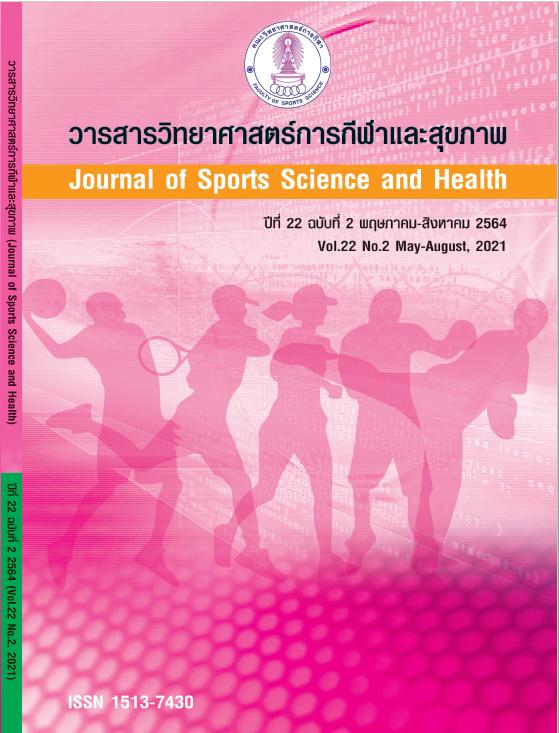BRAIN HEALTH CARE THROUGH NEUROBIC ACTIVITY FOR ELDERLY
Main Article Content
Abstract
Thailand has completely entered the aging society. Hences, taking care of the elderly health is very important due to degenerative changes occur with aging in all organ systems especially, the deterioration of the brain. Therefore, the brain health care is necessary for seniors. Neurobic activities is an effective alternative strategy in delaying brain’s functional decline in elderly especially for attention and memory. The neurobic activity can enhance the nerve impulse and interconnections among different neurons to function together. As a result, the brain works more efficiently. Neurobic activity can be conducted by changing the habitual sensory inputs including sound, sight, smell, taste, and touch. For instance, changing to some new unusual life style, or breaking daily routines in a different way, and soon. Collectively, neurobic activity is beneficial to promote the brain functions as well as to enhance quality of life in elderly.
Article Details
References
Aruntippaitun, S. (2020). Aged society the challenge of Thailand. (Online) Retrieved October 31, 2020, from http://www.dop.go.th/th/know/3/276
Delis, D.C., Lucas, J.A., and Kopelman, M.D. Memory. In: B.S. Fogel, R.B. Schiffer & S.M. Rao (Ed). (2000). Synopsis of neuropsychiatry: 169 – 191.
Ferri, C.P., Prince, M., Brayne, C., Brodaty, H., Fratiglioni, L., Ganguli, M., et al. (2005). Global prevalence of dementia: a Delphi consensus study. The Lancet, 366, 2112-2117.
The foundation of Thai gerontology research and development institute. (2019). Situation of the Thai Elderly 2018. Nakornpathom:Printery Co.,Ltd.
Hempstead, B.L. (2006). Dissecting the Diverse Actions of Pro- and Mature Neurotrophins. Current Alzheimer Research 3(1): 19–24.
Kanthamalee S., and Sripankaew, K. (2013). Effect of neurobic exercise on memory enhancementin the elderly with dementia. Journal of Nursing Education and Practice, 4(3).
Kriengkaisakda, W., and Chadcham, S. (2012). Development of a brain-training rehabilitation program based on neurobics exercise theory for patients with mild dementia. Research Methodology and Cognitive Science, 10(1), 11-25.
Lawrence, C.K., & Manning, R. (1999). Keep your brain alive: 83 Neurobic Exercises to help prevent memory loss and increase mental fitness. New York: Workman Publishing Company.
Ministry of Public Health. (2020). Inspection Guideline. (Online) Retrieved December 10, 2020, from http://data.ptho.moph.go.th/inspec/2563/inspec63_2/triam_doc/
Ngandu, T., Lehtisalo, J., Solomon, A., Levlahti, E., Ahtiluoto, S., Antikainen, R., et al.2015. A 2 Year multidormain intervention of diet, exercise,cognitive training, and vascular risk monitoring versus control to prevent cognitive decline in at-risk elderly people (FINGER): a randomized controlled trial. Lancet 385: 2255-2263.
Napatpittayatorn, P., Thanomwong, K., Weerasak, M., Srisawat C., and Junnu, S. (2019). Effects of neurobic exercise on cognitive function and serum brain-derived neurotrophic factor in the normal to mild cognitive impaired older people: A randomized control trial. Songklanakarin Journal of Science and Technology, 41(3), 551-558. Napatpittayatorn, P. (2019). Promoting brain health via neurobic exercise. Academic Journal of Physical Education, 11(3), 314-324.
Senanarong, W. (2009). Brain exercise against Alzheimer’s disease. (Online) Retrieved December 23, 2020, from http://www. si.mahidol.ac.th/sidoctor/e-pl/ articledetail.asp?id=718
Thavichachart, N. (2009). Exercise the brain before the brain deteriorates. (Online) Retrieved December 31, 2020, from http://cu2530.chula-alumni.com/scripts/goodiesdetail.asp?ID=1467


